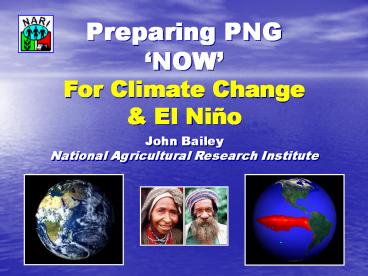Preparing PNG NOW For Climate Change
1 / 36
Title: Preparing PNG NOW For Climate Change
1
Preparing PNG NOW
For Climate Change El Niño
John Bailey
National Agricultural Research Institute
2
1. Climate Change 2. El Niño 3. Preparing PNG for
Drought
3
Climate Change
Global Warming Now Unequivocal - IPCC 2007
1890
4
Climate Change
Floods
5
Climate Change
Drought
6
Climate Change
For the next two decades a warming of 0.2oC per
decade is projected
Anthropogenic warming will continue for
centuries --- even if greenhouse gas
concentrations are stabilized
It is very likely that hot extremes, heat waves
and heavy precipitation events will continue to
become more frequent
It is likely that the area affected by drought
will increase
7
El Niño
8
El Niño
Inter-Annual Climate Variability
9
El Niño
Every 3 to 5 Years
10
El Niño
Floods, Typhoons and Land Slides in East Pacific
Countries
11
El Niño
Drought, Hunger and Forest Fires in West Pacific
Countries
12
El Niño
13
El Niño
Red peaks El Niño events
Average SST anomalies in the Equatorial Pacific
1900-2000
14
El Niño
El Niño strengthening in past 3 decades
Red peaks El Niño events
Average SST anomalies in the Equatorial Pacific
1900-2000
15
El Niño
Bringing increased frequency of severe droughts
in PNG
1997
1982
Red peaks El Niño events
1972
1941
1914
Average SST anomalies in the Equatorial Pacific
1900-2000
16
El Niño
Next severe drought expected in about 5 years time
2011
1997
1982
Red peaks El Niño events
1972
1941
1914
Average SST anomalies in the Equatorial Pacific
1900-2000
17
Preparing PNG for Drought
18
Preparing PNG for Drought
19
Drought-Coping Strategies
20
Drought-Coping Strategies
Following the 1997 El Niño event, NARI developed
a series of drought-coping strategies
21
Drought-Coping Strategies
Following the 1997 El Niño event, NARI developed
a series of drought-coping strategies
Drought tolerant crop varieties
Simple irrigation methods
Food drying, processing storage
Fire control
Frost control
Seed storage
22
Drought-Coping Strategies
Resource stations should be set up or equipped
with the necessary information and resources in
each drought vulnerable district across the
country
Drought tolerant crop varieties
Simple irrigation methods
Food drying, processing storage
Fire control
Frost control
Seed storage
23
Water is the limiting resource! Without
accessible water supplies, human beings, farm
animals, crops and future planting materials will
all perish alike during a severe drought
24
Water Storage/Supply Systems
Five-Year Plan
25
Water Storage/Supply Systems
Five-Year Plan
- Years 1-2
- Pilot Project
- Investigate the potential for mini-reservoirs,
subterranean wells, storage tanks and different
irrigation technologies to supply potable and
irrigation water to Highlands, Lowlands and
Island communities in a series of case studies - Determine the feasibility, costs and
effectiveness of the different water supply
measures and assess their likely uptake by rural
communities
26
(No Transcript)
27
Capped spring supplying irrigation and drinking
water
Drip irrigation system supplied by gravity feed
Upland reservoir for irrigation
Rope Washer pump plus header tank
Lowland reservoir for irrigation and fish farming
Village Standpipe
Crops irrigated using a hose
Water used for crop irrigation
Well for drinking water
Bamboo drip irrigation system
28
Water Storage/Supply Systems
Five-Year Plan
29
Water Storage/Supply Systems
Five-Year Plan
- Years 3-5
- Regions-wide Programme
- A network of NGOs and government agencies should
be established, coordinated and resourced
(financed) to work with communities in
drought-vulnerable regions to establish
sustainable supplies of drinking and irrigation
water by the year 2011 - To avert a humanitarian disaster should a severe
drought occur again within the next 5 or 6 years - To enable rural people to prosper and have better
health, nutrition and living standards under
normal climatic conditions
30
We were not successful in addressing the need of
water in all the affected communities we can
only pray that someone will solve this problem
before the next El Nino type drought appears
(Allen Jonathan, 2000, Food Security for Papua
New Guinea, p 213)
31
The fact that irrigation is not practiced in
Simbu Province reduced the opportunities to grow
food (Edward Kiza and Mathias Kin, 2000, Food
Security for Papua New Guinea p 216)
32
It is essential that we draw up and implement
plans to promote a supply of potable water to
every community in PNG (Peter Barter, 2000,
Food Security for Papua New Guinea, p 260)
33
It is likely that a long-term development
program aimed at reducing the impact of disasters
such as drought would ultimately be more cost
effective than continuing to implement disaster
responses (Royden Howie, 2000, Food Security
for Papua New Guinea, p 252)
34
ADRA compared the cost of supplying food to
various communities with the cost of implementing
a water supply system that could supply
sufficient water for irrigation and drinking In
most cases it was significantly more cost
effective to implement a water supply program
than to feed a community for 3 weeks (Royden
Howie, 2000, Food Security for Papua New Guinea,
p 252)
35
The Opportunity!
An opportunity exists NOW to invest in rural
communities to make them (virtually) immune to
the swings and see-saws of climate change and
enable them to thrive and contribute even more to
the wealth and prosperity of the Nation.
This opportunity should not be missed!
36
THANK YOU































